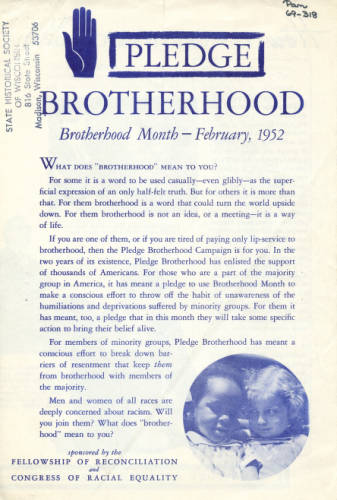YOUR CART
- No products in the cart.
Subtotal:
$0.00
BEST SELLING PRODUCTS

Founded in 1942 by an interracial group of students in Chicago, the Congress of Racial Equality (CORE) pioneered the use of nonviolent direct action in America’s civil rights struggle. Along with its parent organization, the Fellowship of Reconciliation (FOR), CORE members provided advice and support to Martin Luther King during the Montgomery bus boycott. King worked with CORE throughout the late 1950s and into the mid-1960s, when CORE abandoned its dedication to nonviolence and adopted black separatist policies.
Early CORE activists James Farmer, Bayard Rustin, Homer Jack, and George Houser had all been affiliated with FOR, an international peace and justice organization. Influenced by Gandhi, in the 1940s CORE used sit-ins and other nonviolent direct actions to integrate Chicago restaurants and businesses. In 1947 CORE organized the Journey of Reconciliation, a multi-state integrated bus ride through the upper South in order to test the previous year’s Supreme Court ruling against segregation in interstate travel. This precursor to the 1961 Freedom Rides was met with minimal violence, although several of the riders were arrested, and two were sentenced to work on a chain gang in North Carolina.
In the first weeks after the start of the Montgomery bus boycott, CORE-affiliated activists such as James Peck, Rustin, and Jack visited King. Jack wrote to his colleagues, “I never expected to see such a disciplined, effective protest in the South in 1956,” and suggested CORE send field workers to support the movement (Jack, 9 March 1956). During the Montgomery bus boycott, CORE publicized King’s work in its pamphlets. In October 1957 King agreed to serve on CORE’s Advisory Committee.
In the following years, King’s organization, the Southern Christian Leadership Conference (SCLC), worked with CORE on several projects, including the 1959 and 1960 Prayer Pilgrimage for Public Schools in support of integrated education, the Voter Education Project, and the Chicago Campaign. CORE supported southern blacks during the sit-in movement of 1960; CORE field secretaries traveled through the South, advising student activists on nonviolent methods.
CORE organized the Freedom Rides in the spring of 1961. Modeled after the earlier Journey of Reconciliation, the rides took an integrated group through the Deep South. Although King supported the rides, he considered them too dangerous to participate in himself. In Anniston, Alabama, one bus was firebombed, and its fleeing passengers were forced into an angry white mob. As the violence against the Freedom Rides increased, CORE considered halting the project. A Freedom Ride Coordinating Committee was formed by representatives of the Student Nonviolent Coordinating Committee, CORE, and SCLC to sustain the rides.
Following the Freedom Rides, CORE concentrated on voter registration. In 1962, along with other civil rights groups, CORE joined the Council of Federated Organizations (COFO), which coordinated the activities of local and national civil rights organizations in Mississippi. COFO’s efforts culminated in the 1964 Freedom Summer and the Mississippi Freedom Democratic Party (MFDP), which challenged the state’s all-white official delegation at the Democratic National Convention of 1964.
The murder of three CORE workers, Michael Schwerner, Andrew Goodman, and James Chaney, in Mississippi in the summer of 1964, coupled with the limited success of MFDP, led many activists, including some in CORE, to become disenchanted with nonviolence. By 1966 a power struggle within CORE forced Farmer to step down as national director, leaving the more militant Floyd McKissick in his place. After King worked with McKissick during the summer of 1966 on the Meredith March Against Fear, CORE adopted a platform based on Black Power and limited white involvement in the organization.
Following King’s assassination, McKissick called him “the last prince of nonviolence” and declared that nonviolence was “a dead philosophy” (“McKissick Says Nonviolence”). From this point, CORE focused its efforts on black nationalism and political self-determination in the black community.